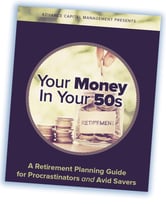Steps to Help Avoid Outliving Your Retirement Savings
July 19th, 2017 | 3 min. read

 What’s scarier than death? Outliving your retirement savings and investments, according to many older Americans.
What’s scarier than death? Outliving your retirement savings and investments, according to many older Americans.
A survey by Transamerica Center for Retirement Studies found 43% of workers ages 50 and older said their greatest fear about retirement was running out of money, above loneliness, boredom and declining health.
And for many baby boomers, outliving your retirement savings is a bigger fear than even dying. In a similar survey by financial firm Allianz, 61% of baby boomers said they are more afraid of running out of money before they died than death itself.
As life expectancies continue to climb, the 10,000 baby boomers expected to retire each day for the next 19 years have to increasingly account for longevity risk when managing their portfolios. Think about it, your retirement may stretch 20-30 years or more.
Furthermore, getting older comes with an increased risk of cognitive decline that can affect your ability to properly manage money. Consider a study published in Neurology that detected a relation between declining financial skills and cognitive impairment.
So in a sense, a danger to some people’s retirement savings and investments is their own selves. However, that can be mitigated with the right financial planning steps.
Here are some ways older adults can protect and preserve retirement assets as they age.
Simplify and diversify your portfolio
Figuring out how to utilize your various income sources – retirement accounts, pension, Social Security, rental income, etc. – to fund your retirement needs can be complicated. For example, after a long career you may have multiple 401(k) accounts. It helps to streamline your finances as much as possible.
You can simplify your investments by consolidating some of your accounts. That reduces the number of income sources to keep track of, while also giving you greater control over your money.
Additionally, diversifying your portfolio– owning several types of investments – can help reduce risk and generate a steadier return. An investment strategy that offers more certainty can be easier to stick with over the long haul.
Don’t become too conservative
As you near retirement, it generally makes sense to lower your risk exposure, meaning a lower stock allocation in your portfolio. But, you still want to keep pace with inflation over a long retirement. Therefore, you need some risk assets like stocks to help generate growth, even though your investment objective isn’t to accumulate earnings as you did before.
Designate a durable financial power of attorney
A power of attorney (POA) is a written document that allows you to designate someone to legally act on your behalf, either immediately or upon your incapacity. If you suffer from a severe cognitive disability, a durable financial power of attorney, who may access your financial information, can help monitor and manage your assets and decrease the chances of you becoming a victim of financial exploitation or scams.
Prepare for health care costs
One way to keep your nest egg afloat is to prepare for the thing that will likely be the biggest drain on your finances in retirement – health care. Remember, Medicare, which you are required to enroll in at age 65, does not cover everything. So, make sure you have the right amount of coverage. Also, build a sizeable emergency fund to help cover any unexpected out-of-pocket medical costs. Finally, take preventive steps now, from routine physicals to eating a healthy diet, to lower your need for medical care in the future – and, subsequently, reduce its strain on your finances.
Read the fine print
Some financial products are heavily marketed on TV and in the news. Often, they sound too good to be true; and, often they are. When considering a financial product, always read the fine print. Annuities, for example, are attractive to many investors because of the income guarantee. However, these insurance products can be expensive and come with many confusing restrictions and high penalties that may override their potential benefits.
Maintain a flexible withdrawal rate
The amount you can safely withdraw from your portfolio depends on many factors, including your wealth, annual expenses, financial goals, other income sources, the age you retire and the market. You may never have to deviate from your initial withdrawal rate. Yet, your personal needs or market conditions are likely to change, and may do so unexpectedly, rendering your withdrawal rate unreasonable. If you’re flexible with your rate, you can adapt to change by scaling back and preserving your savings until things improve.
Work with a trusted financial adviser
In all of life’s pursuits, it helps to have someone at your side. The same goes for retirement planning and asset management. A financial adviser can provide an objective voice to help you make smarter financial decisions. Additionally, an adviser can help protect your money by not only monitoring the financial markets but also you. If you start making financial mistakes, an adviser will be to alert you and your family that something may be wrong.
Living longer is something we should all be thankful for. But for investors, it comes with a set of risks beyond the workings of financial markets. Still, you can also manage these risks and avoid outliving your retirement savings with proper financial planning and guidance along the way.
The best way to avoid the worst-case scenario is to make a plan. If you're thinking about retirement income and how to maximize your retirement savings, this FREE E-BOOK will help you get ahead or catch up. Your Money in Your 50's: A Retirement Planning Guide for Procrastinators and Avid Savers walks you through the most important steps to take in those crucial years before retirement.
Advance Capital Management is a fee-only RIA serving clients across the country. The Advance Capital Team includes financial advisers, investment managers, client service professionals and more -- all dedicated to helping people pursue their financial goals.



